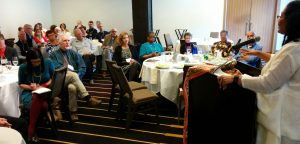“This group has the potential to make an impact,” keynote speaker Lisa Sharon Harper told religious journalists gathered in St. Louis for the annual convention of the Associated Church Press.
Harper, who is Chief Church Engagement Officer for Sojourners and founding executive director of New York Faith & Justice, explained that church communicators “tell the stories that don’t get told.”
And it is these stories, she said, “that can shape the world view and understanding of the church.”
She challenged listeners to seek a deeper understanding of the gospel that makes it truly “good news” for all people—especially for victims of injustice and oppression.
Harper said her own realization that her Christian faith had nothing to say to injustices suffered by her ancestors sparked a 13-year journey of “diving into Scripture.” She found herself particularly drawn to the first two chapters of Genesis.
She learned that Genesis 1 was probably written by priests at the end of the exile in Babylon, in a context of oppression. “The deep” in Genesis 1 means “agony” or oppression.
Brooding over the water, “God’s Spirit positions herself to confront the misery,” Harper said. “Her strategy for engagement is birth, new life. God speaks, and goodness is birthed from a cesspool of despair.”
And then, Harper noted, “The writers of Genesis do a radical thing: they democratize God. They say all humanity is made in the image of God.”
In addition, humans are given dominion over creation. This means we have the responsibility to “protect the wellness of relationships that God declared very good,” Harper said.
“To be made in the image of God is to be created with the capacity to exercise dominion,” she said. “If we govern in a way that doesn’t recognize [the image of God in all people], we diminish, even crush, the image of God on earth.”
Because “we’ve been taught to believe less of certain people,” Harper said, we may tend to invest less in education or health care for those people.
She closed with a series of questions: “How does bias shape the stories we tell? How does it dictate which stories are told? What would it look like for the Christian press to tell stories that would protect, seed, and cultivate the image of God in all?”
